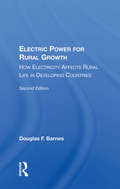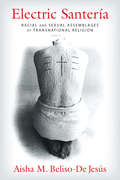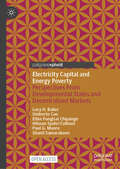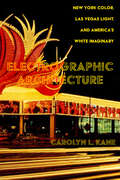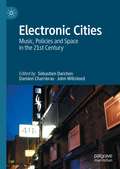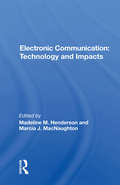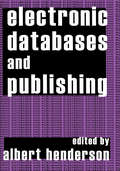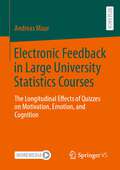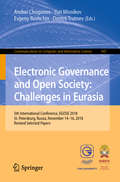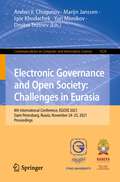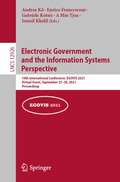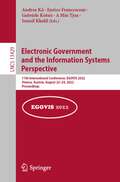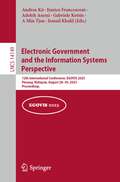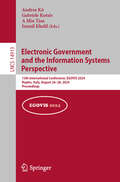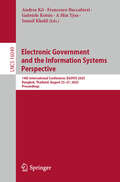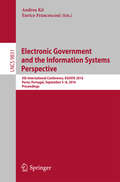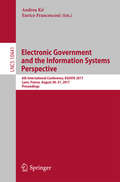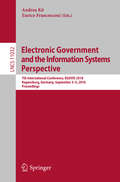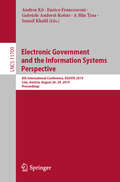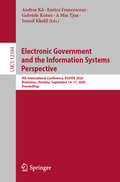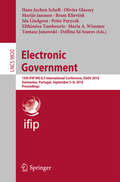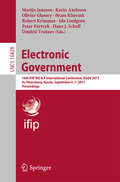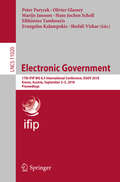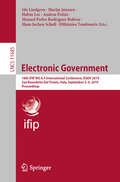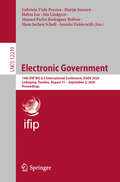- Table View
- List View
Electric Power For Rural Growth: How Electricity Affects Rural Life In Developing Countries
by Douglas F. BarnesThis book offers important historical information on the state of rural electrification in the 1980s. It also summarizes the development of benefit evaluation methods, along with findings from recent research on the impact of rural electrification for development.
Electric Santería: Racial and Sexual Assemblages of Transnational Religion (Gender, Theory, and Religion)
by Aisha Beliso-De JesúsSantería is an African-inspired, Cuban diaspora religion long stigmatized as witchcraft and often dismissed as superstition, yet its spirit- and possession-based practices are rapidly winning adherents across the world. Aisha M. Beliso-De Jesús introduces the term "copresence" to capture the current transnational experience of Santería, in which racialized and gendered spirits, deities, priests, and religious travelers remake local, national, and political boundaries and reconfigure notions of technology and transnationalism.Drawing on eight years of ethnographic research in Havana and Matanzas, Cuba, and in New York City, Miami, Los Angeles, and the San Francisco Bay area, Beliso-De Jesús traces the phenomenon of copresence in the lives of Santería practitioners, mapping its emergence in transnational places and historical moments and its ritual negotiation of race, imperialism, gender, sexuality, and religious travel. Santería's spirits, deities, and practitioners allow digital technologies to be used in new ways, inciting unique encounters through video and other media. Doing away with traditional perceptions of Santería as a static, localized practice or as part of a mythologized "past," this book emphasizes the religion's dynamic circulations and calls for nontranscendental understandings of religious transnationalisms.
Electricity Capital and Energy Poverty: Perspectives From Developmental States and Decentralised Markets
by Lucy H. Baker Umberto Cao Ellen Fungisai Chipango Hilman Syahri Fathoni Paul G. Munro Shanil SamarakoonThis open access book explores the rise of new forms of electricity capitalism, examining how evolving energy systems shape energy consumption and access in five different case studies from the global South. Structured in seven chapters, it begins with a clear theoretical and conceptual foundation and is followed by five compelling case studies, grounded in research insights from Zimbabwe, Mexico, Uganda, Indonesia, and Vanuatu. The book concludes with a synthesis of these findings, paving the way for future discussions on energy poverty in the context of electricity capitalism in the Global South.
Electrographic Architecture: New York Color, Las Vegas Light, and America's White Imaginary
by Prof. Carolyn L. KaneBridging histories of technology, media studies, and aesthetics, Electrographic Architecture forges a critical narrative of the ways in which illuminated light and color have played key roles in the formation of America's white imaginary. Carolyn L. Kane charts the rise of the country's urban advertisements, light empires, and neoclassical buildings in the early twentieth century; the midcentury construction of polychromatic electrographic spectacles; and their eclipse by informatically intense, invisible algorithms at the dawn of the new millennium. Drawing on archival research, interviews, and visual analysis, Electrographic Architecture shows how the development of America's electrographic surround runs parallel to a new paradigm of power, property, and possession.
Electronic Cities: Music, Policies and Space in the 21st Century
by Sébastien Darchen Damien Charrieras John WillsteedThis book examines Electronic Dance Music (EDM) scenes in 18 cities across Africa, the Middle East, Europe, Asia, North America and Australia. It focuses on the historical development of these scenes, with an emphasis on the post-2000 context, including the COVID-19 pandemic and its far-reaching effects. Expert contributors highlight the influence of geographical contexts, as well as cultural and political histories, in the development of mainstream EDM scenes and underground Electronic Dance Music Cultures. This expansive work offers additional insights on cultural and creative policies, planning interventions and regulations associated with nightlife management, and provides a detailed analysis of current challenges inherent to the governance of EDM scenes in contemporary cities.
Electronic Communication: Technology And Impacts
by Madeline M. Henderson Marcia J. MacNaughtonElectronic communications technology and services permeate every aspect of national life. This book examines the current and expected states of the technology and considers the societal impact and policy issues arising from new technological developments. Particular attention is paid to evaluation of computerized conferencing for enhanced communication among researchers in specialized and interdisciplinary fields and to technology assessments of criminal justice and tax administration systems.
Electronic Databases and Publishing
by Albert HendersonThe true pioneers in electronic publishing put their bibliographic databases on tape and online in the 1960s. Nearly all of them had long experience with compiling information for distribution in printed form and a strong market connection. As a result of Soviet advances in science and space technology, American government support for information science and academic libraries flowed freely for a little over a decade, making possible tremendous advances in technology, in retrieval techniques and in sophisticated coverage. Advances in information technology and market conditions have encouraged many more participants to underwrite the development of databases that now extend into the arts, social sciences, business, and popular interests. These essays show how production statistics accompanied by statements of editorial coverage provide a fairly accurate reflection of output of many of the major disciplinary bibliographic databases. The urgent priority of information resources in the 1960s has encouraged comprehensive servicing of the formal research literature as published in journals and monographs. Authors have counted subject words, languages, origins, types of publication, and so on over several decades. This volume also includes articles on some databases that are not strictly bibliographic, such as the CMG database of college courses, which illuminates some of the changes in college textbook publishing. Information seekers will find the many tables of practical use, as guidance to what and how much may be found within each database. Analysts of publishing, of science policy, and of higher education will find information relevant to expenditures, human resources, and other indicators of education, research, and technology activity.
Electronic Feedback in Large University Statistics Courses: The Longitudinal Effects of Quizzes on Motivation, Emotion, and Cognition
by Andreas MaurDigital tools and pedagogies in public higher education are unfolding their potential by providing large groups of students with automated, continuous learning and feedback opportunities. However, most of the existing studies are cross-sectional, unidirectional and focus on a limited selection of relevant target variables and instructional features. In a field study, Andreas Maur used longitudinal latent structural equation modelling with a large sample of students to analyse the interrelations between formative feedback from electronic quizzes and different facets of the control value theory of achievement emotions. The results suggest that regular quizzes most consistently improve self-efficacy, anxiety, effort, course enjoyment, and hopelessness over time. Only feedback effects related to intrinsic motivation were consistently less effective for female and less proficient students, and for students in traditional versus flipped classrooms. These findings highlight the need to scale up formative feedback in higher education and to cultivate feedback systems with higher levels of sophistication, adaptability, and gamification mechanics.
Electronic Governance and Open Society: 5th International Conference, EGOSE 2018, St. Petersburg, Russia, November 14-16, 2018, Revised Selected Papers (Communications in Computer and Information Science #947)
by Dmitrii Trutnev Evgeny Roshchin Andrei Chugunov Yuri MisnikovThis book constitutes the refereed proceedings of the 5th Conference on AElectronic Governance and Open Society: Challenges in Eurasia, EGOSE 2018, held in St. Petersburg, Russia, in November 2018. The 36 revised full papers were carefully reviewed and selected from 98 submissions. The papers are organized in topical sections on smart city infrastructure, policy; digital privacy, rights,security;data science, machine learning, algorithms, computational linguistics; digital public administration, economy, policy; digital services, values, inclusion; digital democracy, participation, security, communities, social media, activism; social media discourse analysis; digital data, policy modeling; digital government, administration, communication.
Electronic Governance and Open Society: 8th International Conference, EGOSE 2021, Saint Petersburg, Russia, November 24–25, 2021, Proceedings (Communications in Computer and Information Science #1529)
by Marijn Janssen Andrei V. Chugunov Dmitrii Trutnev Yuri Misnikov Igor KhodachekThis book constitutes the refereed proceedings of the 8th Conference on Electronic Governance and Open Society: Challenges in Eurasia, EGOSE 2021, held in St. Petersburg, Russia, in November 2021.The 21 full papers were carefully reviewed and selected from 69 submissions, additionally one invited paper has been included in this volume. The papers are organized in topical sections on digital technology and design; digital Society; digital government and economy.
Electronic Government and the Information Systems Perspective: 10th International Conference, EGOVIS 2021, Virtual Event, September 27–30, 2021, Proceedings (Lecture Notes in Computer Science #12926)
by Enrico Francesconi Ismail Khalil A Min Tjoa Gabriele Kotsis Andrea KöThis volume LNCS 12926 constitutes the papers of the 10th International Conference on Electronic Government and the Information Systems Perspective, EGOVIS 2021, held in September 2021 as part of the DEXA 2021 conference. The event was held virtually due to COVID-19 pandemic. The 13 full papers presented were carefully reviewed and selected from 21 submissions and focus on information systems and ICT aspects of e-government. The papers are organized in 3 topical sections: e-government theoretical background and cases; identity management and legal issues; artificial intelligence and machine learning in e-government context.
Electronic Government and the Information Systems Perspective: 11th International Conference, EGOVIS 2022, Vienna, Austria, August 22–24, 2022, Proceedings (Lecture Notes in Computer Science #13429)
by Enrico Francesconi Andrea Kő Ismail Khalil A Min Tjoa Gabriele KotsisThis volume LNCS 12429 constitutes the papers of the 11th International Conference on Electronic Government and the Information Systems Perspective, EGOVIS 20221, held in Vienna, Austria, in August 2022. The 11 full papers presented were carefully reviewed and selected from 16 submissions and focus on information systems and ICT aspects of e-government. The papers are organized in 3 topical sections: e-government theoretical background; semantic technologies and legal issues;; artificial intelligence and machine learning in e-government context.
Electronic Government and the Information Systems Perspective: 12th International Conference, EGOVIS 2023, Penang, Malaysia, August 28–30, 2023, Proceedings (Lecture Notes in Computer Science #14149)
by Enrico Francesconi Ismail Khalil A Min Tjoa Gabriele Kotsis Andrea Kö Adeleh AsemiThis book constitutes the proceedings of the 12th International Conference on Electronic Government and the Information Systems Perspective, EGOVIS 2023, which took place in Penang, Malaysia, during August 28-30, 2023.The 8 full papers presented together with 1 short paper were carefully reviewed and selected from a total of 17 submissions. They were organized in topical sections as follows: e-Government; strategy; artificial intelligence.
Electronic Government and the Information Systems Perspective: 13th International Conference, EGOVIS 2024, Naples, Italy, August 26–28, 2024, Proceedings (Lecture Notes in Computer Science #14913)
by Ismail Khalil A Min Tjoa Gabriele Kotsis Andrea KöThis book constitutes the proceedings of the 13th International Conference on Electronic Government and the Information Systems Perspective, EGOVIS 2024, which took place in Naples, Italy, in August 2024. The 10 full and 5 short papers included in this book were carefully reviewed and selected from 24 submissions. They were organized in topical sections as follows: AI in E-Government; E-Government cases; mobile government and digital inclusion; open government data and security.
Electronic Government and the Information Systems Perspective: 14th International Conference, EGOVIS 2025, Bangkok, Thailand, August 25–27, 2025, Proceedings (Lecture Notes in Computer Science #16049)
by Andrea Kő Ismail Khalil A Min Tjoa Francesco Buccafurri Gabriele KotsisThis book constitutes the proceedings of the 14th International Conference on Electronic Government and the Information Systems Perspective, EGOVIS 2025, held in Bangkok, Thailand, during August 25–27, 2025. The 11 full and 4 short papers included in the proceedings were carefully reviewed and selected from 29 submissions. They were organized in topical sections as follows: Legal Aspects and Semantic Approaches; Digital Transformation and E-government Inclusion; AI in E-Government; E-Government Cases.
Electronic Government and the Information Systems Perspective: 5th International Conference, EGOVIS 2016, Porto, Portugal, September 5-8, 2016, Proceedings (Lecture Notes in Computer Science #9831)
by Enrico Francesconi Andrea KőThis book constitutes the refereed proceedings of the 5th International Conference on Electronic Government and the Information Systems Perspective, EGOVIS 2016, held in Porto, Portugal, in September 2016, in conjunction with DEXA 2015. The 22 revised full papers presented together with three invited talk were carefully reviewed and selected from 27 submissions. The papers are organized in the following topical sections: e-government cases - legal issues; e-government cases - technical issues; open data and transparency; knowledge representation and modeling in e-government; intelligent systems in e-government; e-government research and intelligent systems; e-government data and knowledge management; identity management in e-government.
Electronic Government and the Information Systems Perspective: 6th International Conference, EGOVIS 2017, Lyon, France, August 28-31, 2017, Proceedings (Lecture Notes in Computer Science #10441)
by Enrico Francesconi Andrea KőThis book constitutes the refereed proceedings of the 6th International Conference on Electronic Government and the Information Systems Perspective, EGOVIS 2017, held in Lyon, France, in August 2017. The 20 revised full papers presented were carefully reviewed and selected from 24 submissions. The papers areorganized in the following topical sections: digitalization and transparency; open data ecosystems; intelligent systems in e-government; e-government research and intelligent systems; m-government and inclusion; e-government cases - data knowledge management; and knowledge management in the context of e-government.
Electronic Government and the Information Systems Perspective: 7th International Conference, EGOVIS 2018, Regensburg, Germany, September 3–5, 2018, Proceedings (Lecture Notes in Computer Science #11032)
by Enrico Francesconi Andrea KőThis book constitutes the refereed proceedings of the 7th International Conference on Electronic Government and the Information Systems Perspective, EGOVIS 2018, held in Regensburg, Germany, in September 2018. The 19 revised full papers presented were carefully reviewed and selected from 22 submissions. The papers are organized in the following topical sections: digitalization and transparency; challenges in e-government technology and e-voting; knowledge management in the context of e-government; semantic technologies and the legal aspects; open data and open innovation; and e-government cases - data and knowledge management.
Electronic Government and the Information Systems Perspective: 8th International Conference, EGOVIS 2019, Linz, Austria, August 26–29, 2019, Proceedings (Lecture Notes in Computer Science #11709)
by Enrico Francesconi Andrea Kő Ismail Khalil A Min Tjoa Gabriele Anderst-KotsisThis book constitutes the refereed proceedings of the 8th International Conference on Electronic Government and the Information Systems Perspective, EGOVIS 2019, held in Linz, Austria, in August 2019. The 17 full papers presented were carefully reviewed and selected from 25 submissions. The papers are organized in the following topical sections: open data and open innovation; data-driven approaches in e-government; e-government cases – data and knowledge management; e-government theoretical background; and digitalization and transparency.
Electronic Government and the Information Systems Perspective: 9th International Conference, EGOVIS 2020, Bratislava, Slovakia, September 14–17, 2020, Proceedings (Lecture Notes in Computer Science #12394)
by Enrico Francesconi Andrea Kő Ismail Khalil A Min Tjoa Gabriele KotsisThis book constitutes the refereed proceedings of the 9th International Conference on Electronic Government and the Information Systems Perspective, EGOVIS 2020, held in Bratislava, Slovakia, in September 2020. The 15 full and one short papers presented were carefully reviewed and selected from 24 submissions. The papers are organized in the following topical sections: Knowledge representation and modeling in e-Government; e-Government theoretical background; E-Government cases - data and knowledge management; identity management and legal issues; artificial intelligence and machine learning in e-Government context.
Electronic Government: 15th IFIP WG 8.5 International Conference, EGOV 2016, Guimarães, Portugal, September 5-8, 2016, Proceedings (Lecture Notes in Computer Science #9820)
by Efthimios Tambouris Maria A. Wimmer Delfina Sá Soares Tomasz Janowski Hans Jochen Scholl Marijn Janssen Bram Klievink Ida Lindgren Peter Parycek Olivier GlasseyThis book constitutes the refereed proceedings of the 15th IFIP WG 8.5 International Conference on Electronic Government, EGOV 2016, held in Guimaraes, Portugal, in September 2016, in conjunction with the 8th International Conference on eParticipation, ePart 2016. The 24 revised full papers presented were carefully reviewed and selected from 87 submissions. The papers are clustered under the following topical sections: foundations; benchmarking and evaluation; information integration and governance; services; evaluation and public values; EGOV success and failure; governance; social media; engagement; processes; policy-making; trust, transparency and accountability; open government and big/open data; smart government/governance/cities.
Electronic Government: 16th IFIP WG 8.5 International Conference, EGOV 2017, St. Petersburg, Russia, September 4-7, 2017, Proceedings (Lecture Notes in Computer Science #10428)
by Marijn Janssen, Karin Axelsson, Olivier Glassey, Bram Klievink, Robert Krimmer, Ida Lindgren, Peter Parycek, Hans J. Scholl and Dmitrii TrutnevThis book constitutes the proceedings of the 16th IFIP WG 8.5 International Conference on Electronic Government, EGOV 2017, held in St. Petersburg, Russia, in September 2017, in conjunction with the 9th International Conference on eParticipation, ePart 2017.The 34 revised full papers presented were carefully reviewed and selected from 74 submissions. The papers are clustered under the following topical sections: Smart Governance, Government and Cities; Service delivery; Organizational aspects; Infrastructures; Big and Open Linked Data; Open Government; and Evaluation.
Electronic Government: 17th IFIP WG 8.5 International Conference, EGOV 2018, Krems, Austria, September 3-5, 2018, Proceedings (Lecture Notes in Computer Science #11020)
by Efthimios Tambouris Hans Jochen Scholl Marijn Janssen Peter Parycek Olivier Glassey Evangelos Kalampokis Shefali VirkarThis book constitutes the proceedings of the 17th IFIP WG 8.5 International Conference on Electronic Government, EGOV 2018, held in Krems, Austria, in September 2018, in conjunction with the 10th International Conference on eParticipation, ePart 2018.The 22 revised full papers presented were carefully reviewed and selected from 48 submissions. The papers are clustered under the following topical sections: General E-Government and Open Government; Open Data, Linked Data, and Semantic Web; Smart Governance (Government, Cities and Regions); and Artificial Intelligence, Data Analytics and Automated Decision-Making.
Electronic Government: 18th IFIP WG 8.5 International Conference, EGOV 2019, San Benedetto Del Tronto, Italy, September 2–4, 2019, Proceedings (Lecture Notes in Computer Science #11685)
by Efthimios Tambouris Hans Jochen Scholl Marijn Janssen Ida Lindgren Manuel Pedro Rodríguez Bolívar Habin Lee Andrea PoliniThis book constitutes the proceedings of the 18th IFIP WG 8.5 International Conference on Electronic Government, EGOV 2019, held in San Benedetto del Tronto, Italy, in September 2019, in conjunction with the IFIP WG 8.5 IFIP International Conference on Electronic Participation (ePart 2019) and the International Conference for E-Democracy and Open Government Conference (CeDEM 2019).The 27 revised full papers presented were carefully reviewed and selected from 64 submissions. The papers are clustered under the following topical sections: E-Government Foundations; E-Government Services and Open Government; Open Data: Social and Technical Aspects; AI, Data Analytics and Automated Decision Making; and Smart Cities.
Electronic Government: 19th IFIP WG 8.5 International Conference, EGOV 2020, Linköping, Sweden, August 31 – September 2, 2020, Proceedings (Lecture Notes in Computer Science #12219)
by Hans Jochen Scholl Marijn Janssen Ida Lindgren Anneke Zuiderwijk Manuel Pedro Rodríguez Bolívar Habin Lee Gabriela Viale PereiraThis book constitutes the proceedings of the 19th IFIP WG 8.5 International Conference on Electronic Government, EGOV 2020, held in Linköping, Sweden, in August/September 2020, in conjunction with the IFIP WG 8.5 IFIP International Conference on Electronic Participation (ePart 2020) and the International Conference for E-Democracy and Open Government Conference (CeDEM 2020). The conference was held virtually due to the COVID-19 pandemic. The 30 full papers presented were carefully reviewed and selected from 118 submissions. The papers are clustered under the following topical sections: e-government foundations; e-government services and open government; open data: social and technical aspects; AI, data analytics, and automated decision making; and smart cities.
